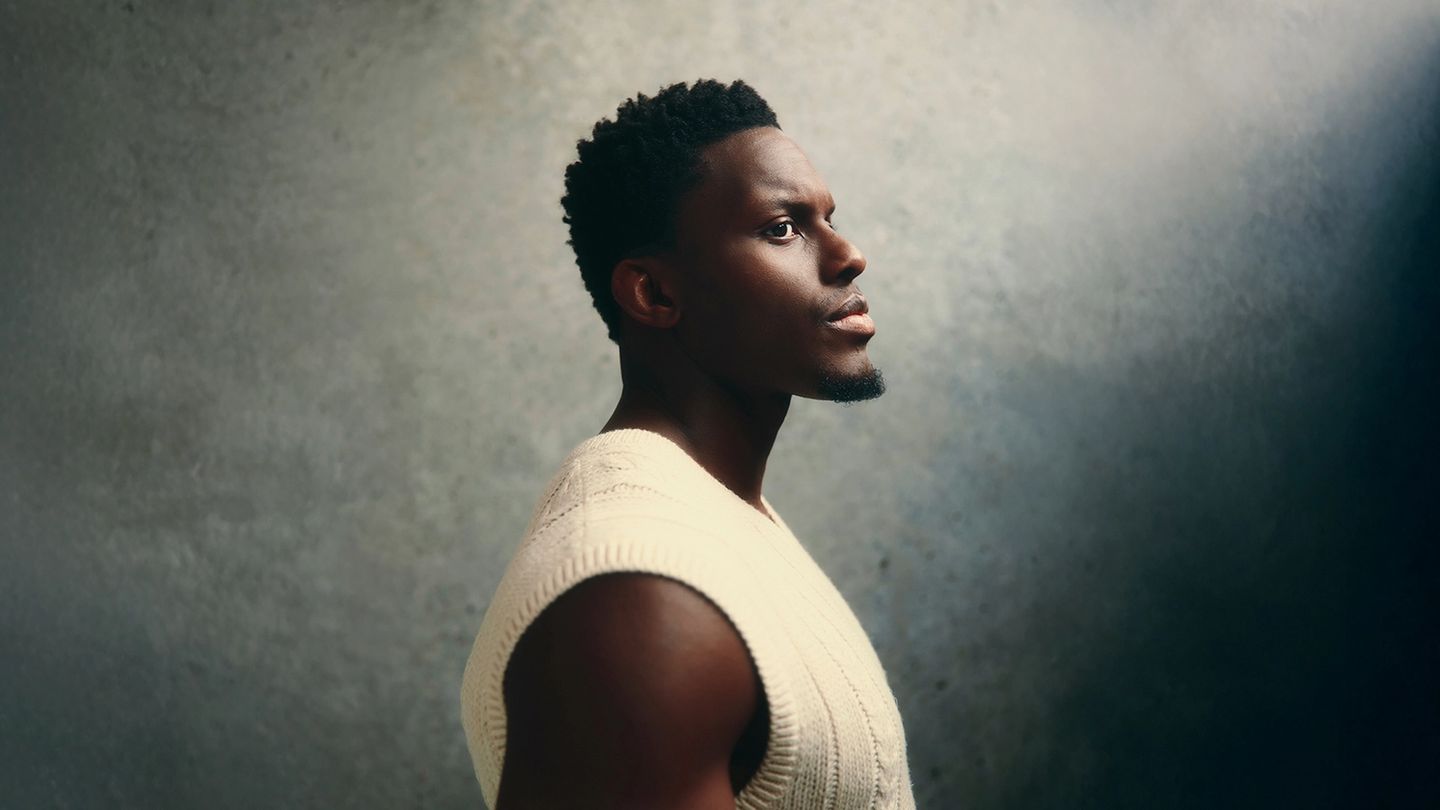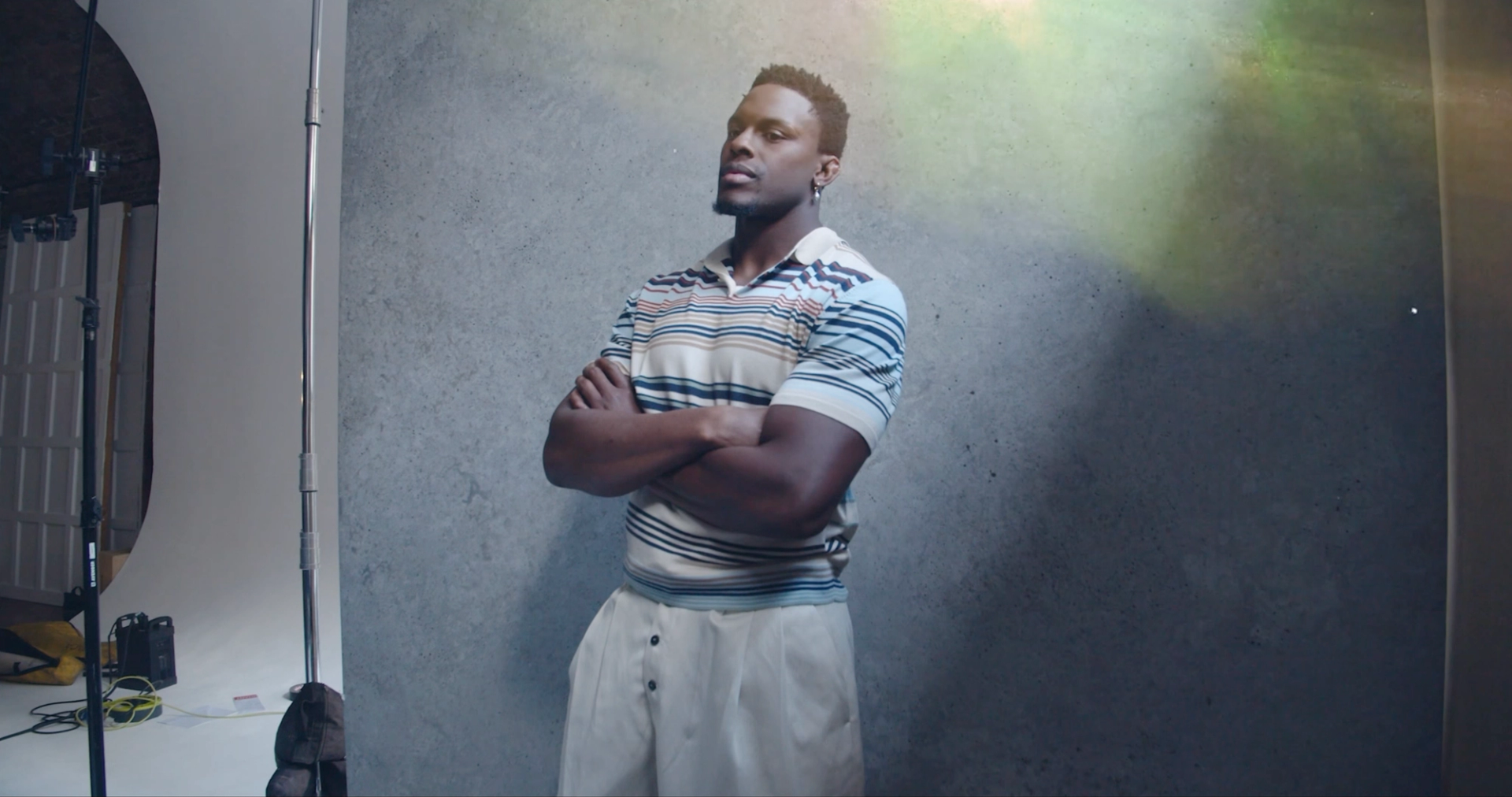

Maro Itoje’s forward thinking
More than a decade since his senior debut, Maro Itoje is now the captain he was always tipped to become, both for club and country. Will this summer’s tour with The British & Irish Lions cap off a memorable campaign for the talismanic second row?
- Words: Josh Lee
- Photography: Adam Fussell
- Styling: Zak Maoui
“I guess I’ve always had some leadership abilities, and sport is my vehicle to express those capabilities,” says Maro Itoje, who’s had quite the gear shift this season. Not that his career has been short in honours or responsibility or prominence – five Premierships, three European Champions Cups, three Six Nations titles and player of the series in his second tour with The British & Irish Lions all front his list of accolades – but the Saracens second row has had his sage reputation somewhat officially formalised in the past months: first, by being handed the captaincy of his club in August, and then by being asked to lead England at this year’s Six Nations.
“It was a tremendous honour,” Itoje says of his appointment at national level. “It’s a huge responsibility, but I think I’m at a point in my life where I’m ready for that extra responsibility. It’s my job now to work hard to make sure I’m able to do it justice.”

With the Six Nations wrapped up – a relatively successful campaign for England, who finished second behind a France side spearheaded by the world’s best, Antoine Dupont – Itoje is immediately back to work with Saracens, but he’s still had time to reflect on the competition recently gone.
“I think we moved forward, individually and collectively as a team,” he says. “Obviously, you want to win the tournament, and while that’s not always possible, I think we gave a good account of ourselves.”
It was a championship with positives, and one that has given respite to head coach Steve Borthwick, who’s previously been accused of a stifling playing style. Following an opening weekend loss to Ireland, England went on to secure wins in their remaining fixtures, including a frantic, dramatic victory over France at home, and a relentless 10-try rout against Wales at the Principality Stadium. Young fly-half Fin Smith exhibited test quality, and the back-row trio of Tom Curry, Ben Curry and Ben Earl proved their prowess. Itoje, who scored the opening try in Cardiff, continued to be England’s steadfast foundation, having now played every minute of 30 consecutive Six Nations games.
BELSTAFF jacket, £550, belstaff.com; DUNHILL shirt, £475, tie, £255, all dunhill.com
Even since Itoje’s fledgling days at Saracens, a club he’s been professionally signed to since 2012, he’s been earmarked as a future captain of his country. His coalescence of abrasion and confrontation with a considered head and a statesman-like presence has long made for a fine leadership blueprint. (In 2014, Itoje captained England’s U20s Junior World Championship-winning side.)
Former England head coach Eddie Jones, however, thought differently. “I might be wrong, but I am not sure Maro is a future England captain,” he wrote in his book, Leadership: Lessons from My Life in Rugby. “He is going to be one of the great players, but Maro is very inward-looking. He drives himself rather than anyone else. He doesn’t usually influence people off the field.”
It was an extraordinary claim to make, especially as Jones – who has since reversed that stance – was part of the England set-up at the time. But following his captaincy of a pretty promising few weekends, Itoje seems to have brushed off this past criticism.
“Everyone’s entitled to their own opinion,” he says of Jones’s remarks. “He had an opinion and other people have had opinions, whether positively or negatively. You can’t pay too much attention to it. I think you just have to take it at face value and trust your own intuition and your own judgment. At times like that, it’s important to have a clear sense of self, your own identity, and a good idea of what you’re about as a person.”
“When top players get the armband, it gives them superhuman strength,” World Cup winner Matt Dawson said in his BBC Sport column. “If anything, Itoje has got a bit quieter, but his [performances] are shouting from the rooftops. He is so much more disciplined; he doesn’t give as many penalties away. There is less gesticulating. He used to cheer and be very expressive but he has an absolute killer instinct about him at the moment in everything he does.”
Though the statement performance against Wales shouldn’t be viewed in isolation according to Itoje – “We kind of blew them away, but I think that’s just a build-up of what we have been building towards” – it wouldn’t have harmed a few players’ bid to get into The British & Irish Lions squad that travels to Australia this summer.
Itoje has already been part of two: first, as the youngest player in the 2017 tour to New Zealand (a 1–1 series draw), and then to South Africa (a 2–1 win for the Springboks) four years later.
“The second one was during Covid, so that was probably the biggest shift in the dynamic,” Itoje says, when comparing his two experiences. “The Lions suffered greatly as a result, having a touring party where you can only go to one hotel, and stay in one environment.” It was extremely challenging he says, as the great thing about The Lions is the interaction with the fans and the community in the country the party is playing in.
Big, towering performances in Itoje’s second tour, in which he reignited his engine room partnership with Wales’s Alun Wyn Jones – “A wily old operator who knows his stuff” – not only earnt him The Lions’ player of the series, but also firmed up his status as a world great.
“It’s important to have a clear sense of self, your own identity”
On 8th May, Lions head coach Andy Farrell will select his final squad, and the small talk has already got big, with Itoje strongly backed to receive his third captaincy in under a year. Were it to happen, he would join a coterie of legendary second rows who’ve skippered a tour: Martin Johnson (1997 and 2001), Paul O’Connell (2009) and Jones (2021).
But Itoje, a person of calm and composure, has refused to let the noise in. “Being a part of the squad is a huge honour, and anything more than that would also be a tremendous honour,” he says of the speculation.
“I will support whoever is in that role. I want The Lions to be successful, to be a great organisation, whether I’m in this tour or not in this tour. And I think it’s bigger than me and my own ambition. It’s huge.”
DUNHILL V-neck jumper, £1,295, dunhill.com; VALENTINO GARAVANI trousers, £1,150, selfridges.com; OMEGA Seamaster 300 41mm, £12,800, omegawatches.com
At first, rugby didn’t come easy to Camden-born Itoje, who began playing at 11, when boarding at St George’s School in Harpenden, the same school attended by England internationals Owen Farrell and George Ford. As a British Nigerian, he wasn’t formed by a traditional rugby background – his parents, he says, weren’t aware of rugby in their adolescence, so he, by default, wasn’t raised in and around that culture. When he started, he was with children who had been playing mini rugby since they were five or six; by comparison, he didn’t know the rules, bar the fact you could tackle people. “But, you know, we found a way”.
A scholarship to Harrow School followed, as did a rise through the Saracens academy and the resulting professional contract. The home he grew up in was always vibrant, full of laughter, food and people, and the values common in a Nigerian household – respect for elders, studying well, a relentless drive and work ethic – and his religion kept him grounded.
“I’m a Christian. My faith is a huge part of my life, and it’s definitely a guiding principle to how I want to live my life and how I want to be,” Itoje says. “My parents played a pivotal role in my upbringing – they provided an environment where I could explore, thrive and enjoy myself as well as experience a number of different things, both in the UK and abroad”.
His parents said he could pursue rugby, but not at the sacrifice of higher education. Enrolment at SOAS University of London to read Politics can be seen as a sort of down payment, with Itoje undertaking his degree while developing his bones at Saracens. Gym, train, lectures, sleep, repeat.
Following his BA, Itoje also completed an MBA at Warwick Business School, in 2023.
Consistency, it seems, is the linchpin of Itoje’s ethos. He still largely plays second row, he learned his trade through every stage of the rugby path, he’s been signed to the Saracens senior side for more than a decade. His life, he says, is still pretty much the same as it was then. His understanding of his position’s fundamentals – acute decision-making at the lineout, quality jackalling at the breakdown, dominance in contact – has lead to his talismanic status, both for club and country.
“You don’t really achieve anything without being consistent,” Itoje says about his approach. “It is the key to building something that is sustained and successful over a period of time. If you’re not consistent, then it’s likely that you will have a period of time where you’re successful, then you drop, then maybe you come back, then you drop. Or you have a period of time where you’re successful and you never get back to that. I want to have a career that is successful over a period of time, not just for a year or two”.
PAUL SMITH polo shirt, £200, paulsmith.com; JACQUEMUS trousers, £590, mytheresa.com; TUDOR Pelagos FXD 42mm Black carbon composite case, £3,400, tudorwatch.com
Though Itoje is hard-wired to the taxing demands of the paddock, it’s been well documented that he – like any modern-day athlete – has pursuits outside his main job.
Last summer, NFL stars Travis and Jason Kelce penned a $100m (£77m) podcast deal with Amazon. Lewis Hamilton has co-produced the upcoming F1 film, starring Brad Pitt and Damson Idris.
Itoje’s endeavours, meanwhile, are rooted in the philanthropic – and, he says, in one way or another, he has been thinking about his post-rugby career since he started playing the game professionally. “I’m not going to play rugby forever. Rugby is an important part of my life, but it’s not going to constitute all of it,” he says. “From what I’ve experienced and what I’ve observed [is that] anyone who’s had a second career, they look forward. They don’t look at the past and try and build their life off the back of that. I want to be looking positively forward, as opposed to hanging on to whatever I was able to achieve in the past.”
He doesn’t want to join the punditry circuit – “I’m not averse to the odd bit here or there, but I don’t want to be part of the weekly roster” – he states. “The world is a big and wonderful place, and there’s a whole number of opportunities, so I want to be ambitious and explore and see what can be achieved outside the realms of rugby,” he says.
In 2023, Itoje launched The Pearl Fund, an organisation that provides disadvantaged children in both Nigeria and the UK with access to quality schooling, as well as the necessary accompanying resources. In Nigeria, this support includes full private-school tuition coverage, funding for coding classes, and family support so that each child can focus firmly on their learning. In the UK, The Pearl Fund is working to team up with UK charities to provide additional STEM and music support.
“We believe through education, a child, a person, an individual can control the narrative of their life”, says Itoje.
AMI coat, £2,200, amiparis.com; CANALI V-neck jumper, £490, canali.com; &SONS jeans, £150, andsons.co.uk; OMEGA Seamaster Diver 300M 42mm, £13,100, omegawatches.com
Art and culture are other pillars whose virtues Itoje has thrown himself behind. In 2023, he also co-founded Akoje Gallery, an African art gallery that provides a global platform for African, Caribbean and diaspora artists.
“We believe African art is amazing and truly special, but a lot of artists in the continent don’t have the opportunity of exposure,” says Itoje, a collector of African art himself, who was first drawn to it for its dynamism, colours and textures.
The venture, whose debut exhibition was in December 2023, has existed as a virtual gallery and done stints around the world, and is currently slated for two London shows in May. The first will feature the mixed-media artist Olaoluwa Qozeem’s ‘Happiness Will Bless Us’, followed by Oluwole Omofemi’s study of Jean-Michel Basquiat.
“I want to be looking positively forward, as opposed to hanging on to whatever I was able to achieve in the past”
In a similar vein, Itoje’s non-profit Akoje Residency provides pathways for African, Caribbean, diaspora and SWANA region artists to develop their craft, offering a select number a three-month stay at Dumfries House, Scotland, where they can make use of an array of workshops – screen-printing and stonework among them – on the estate.
The notions of education, grassroots engagement and using status for progressing worthy causes have long been associated with Itoje, who has become a sort of de facto spokesperson for representation and the topics of the day.
He has talked openly about politics, going on the record in 2022 to say he would vote for Labour – an atypical move in the sporting world, where public profiles are so precisely managed. With the Black Lives Matter protests, he became an even more prominent voice on race and structural injustices. Naturally, there have been questions put to him about whether he has intentions to enter the political machine.
“With politics, there’s many ways in which one could contribute,” he says. “While I’m not saying here that I’m going to run for elected office, there’s a number of ways in which one can be political without doing that.”
His philanthropic work is perhaps a vessel for that.
“You can’t really divide politics from the personal. I’m sure it will remain a part of my life in some way, shape or form. The degree and measure, I do not know at this point, but I’m sure it will.”
The main focus for now, however, is rugby, and there’s somewhat of a mantra that keeps Itoje on this constant path, even with the cyclone of pressure that comes with life in the public eye: keep the main thing the main thing.
“I am a big believer in having things to do outside of rugby”, says Itoje. “And while it’s important to have other things that are engaging, it is also important to keep the main thing the main thing. Rugby is my primary job at this point in time. So, I need to make sure that I give all of my attention to rugby and service all the professional aspects of my career for me to be able to perform at the highest level for a long period of time.”
RALPH LAUREN Purple Label sleeveless jumper, £1,470, ralphlauren.co.uk; PAUL SMITH trousers, £610, paulsmith.com; IWC SCHAFFHAUSEN Portugieser Automatic 42, £22,700, iwc.com
The plan, he says, is to bow out in 2030. New decade, new challenge. “I think it makes sense for me, for where I am in my career, and makes sense for, hopefully, what I go on to do post-career. I want to go out in good health and on my terms. I don’t want to be one of those who sticks around for longer than required or longer than needed.”
Before then, there are still some considerable dates to pencil into his calendar. Perhaps another Lions tour to New Zealand, in 2029. And two years prior to that, there’s the World Cup in Australia, the scene of England’s 2003 triumph.
“We’ll see… We’ll see… This is a huge World Cup,” he says, smirking, when he’s reminded of what’s still on the path ahead. “I’ve managed to get a silver medal. I’ve got a bronze medal,” he says, referring to the tournaments in 2019 and 2023, respectively. “So, by God’s grace, we’re gunning for that gold.”
Photography assistant: Eliza Manley
Gaffer: Jack Johnson
Groomer: Bianca Simone Scott
Art direction and production: Freya Anderson
This feature was taken from our Spring 2025 issue. Read more about it here.
Further reading


What Patek Philippe Was in Succession


